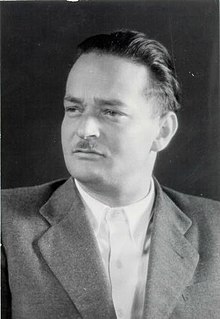Boris Kidrič
Boris Kidrič | |
|---|---|
 | |
| Prime Minister of Slovenia | |
| In office 5 May 1945 – June 1946 | |
| President | Josip Vidmar |
| Preceded by | Position Established |
| Succeeded by | Miha Marinko |
| Personal details | |
| Born | 10 April 1912 Yugoslavia |
| Political party | League of Communists |

Boris Kidrič (10 April 1912 – 11 April 1953) was a Slovene and Yugoslav politician and revolutionary who was one of the chief organizers of the
Early life
Kidrič was born in Vienna, then capital of the Austro-Hungarian Empire, as the son of the prominent Slovene liberal literary critic France Kidrič.[2] He became a communist while still a teenager, aged fifteen, and was arrested for his writings, as well as for organisational and agitative work among Slovene factory workers, subsequently serving a year's prison term before having even reached the age of twenty.[2]
Political career
In the early 1930s, Kidrič was drafted by the communist publicist
During the
After the end of
Kidrič attended negotiations in Moscow following the end of the war, and then noted that the Soviet government under Joseph Stalin perceived Yugoslavia not as an equal socialist state, but as a part of its own sphere of influence.[7] In the fall of 1950, he was recorded as having spoken of being "duped" by the Soviets in the past.[8]
He became a member of the Yugoslav Politburo in 1948, and was in charge of the Yugoslav economy from 1946 until his death.
Alongside
Kidrič was also the main architect of the first
In 1953, he died from leukemia in Belgrade.
Honours and awards
He was awarded the
Among the foreign decorations were the
References
- ISBN 9780810872165.
- ^ a b c "Boris Kidric, visionary architect of Yugoslavia's socialist alternative". Morning Star. 24 November 2021. Retrieved 9 October 2023.
- ISSN 0022-0094.
- ^ Banac 1988, pp. 82, 83.
- ^ Poberšič, Renato, & Damjan Hančič. 2012. Povojne zaplembe judovskega premoženja. Irena Šuni & Hannah Starman (eds.), Slovenski Judje: zgodovina in holokavst, pp. 283–292. Maribor: Center judovske kulturne dediščine Sinagoga Maribor, p. 285.
- ISBN 978-3-7001-8198-9, retrieved 9 October 2023
- ISSN 0030-6428.
- ISSN 1049-7544.
- ^ ISBN 978-1-55753-838-3, retrieved 9 October 2023
- ^ "Vinca Special Weapons Facilities - Serbia". Retrieved 2 January 2011.
Sources
- Enciklopedija Slovenije (Ljubljana: Mladinska knjiga, 1987–2002), book 5, 62-63.
- Božo Repe, Rdeča Slovenija (Ljubljana: Sophia, 2003).
- Banac, Ivo (1988). With Stalin Against Tito: Cominformist Splits in Yugoslav Communism. Cornell University Press. ISBN 0-8014-2186-1.



